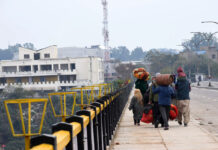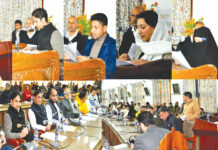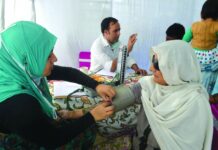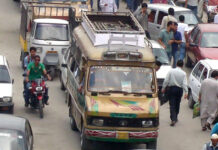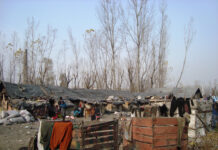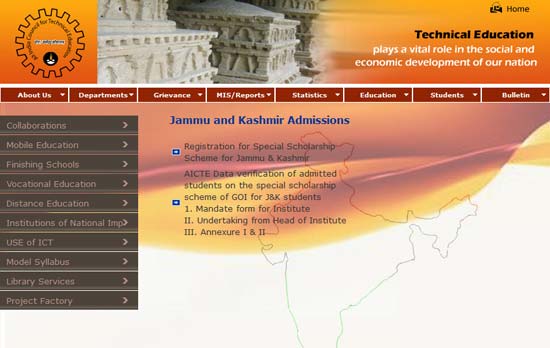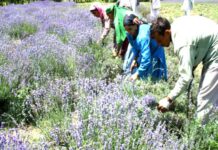The room is neat but lifeless. Quilts and mattresses lie neatly piled on a bed in one corner near the lone window. A small TV rests on a wooden stand in the opposite corner. Posters with verses of Quran inscribed in multiple hues are pasted on the walls all around. A curtain screens a wooden chest in one of the walls. It contains books and notebooks. One of the notebooks carries political science notes for class 12. The first question reads – what were the conditions of Indians on the eve of British rule in India?
The boy who took the notes is dead now. For his class 12 examinations, he was probably trying to learn why Indians protested British rule. Mohammad Amin Tantray, 22, might not have imagined that his own death would trigger a month long agitation by his villagers to object to another rule – the rule of the gun.
Tantray and another youth from Sopore were killed in an incident of indiscriminate firing by Rashtriya Rifles in Bomai on February 21. After the incident, villagers sought the removal of the army camp besides punishment to culprits. While the camp has been removed, the villagers say that justice is yet to be done. They say they have suspended the agitation, not given it up.
While Amin’s death was a trigger, villagers say that the protest was long overdue. Shooting three boys – one of them was critically injured and is still in hospital – was the latest in a series of episodes. Villagers say that protesting the presence of Rajinder Post of 22 Rashtriya Rifles in their village that cost some of them their lives and others their peace of mind was the ‘only available option’.
The story of the suppression begins years earlier. “In 2003, the Rashtriya Rifles men from this post entered a house in neighbouring Tujar village and dragged a groom Mushtaq Ahmad Peer out. He had just returned with his bride. They took him along. One day later, a part of his body was handed over to his family,” says Ghulam Hassan Shah, general secretary of the Bomai Coordination Committee. The committee spearheaded the protests following the Bomai incident and ensured protests remain completely peaceful. “The army said Peer had died in a mine explosion in a jungle. Why was he taken to a place where landmines were planted, we still do not know.”
In 2005, villagers say, the army raided the local Girls High School after a grenade explosion and roughed up the staff and girls there. Saima Muzaffar, a class 10 student relives the horror of that raid. “It was recess period. I was sitting in the ground along with other girls that we heard an explosion. We rushed inside the classes for cover. Soon we could see army men running into the school compound. Some entered through the gate while others crossed over the compound wall. Soon they had started beating teachers in the ground,” she says. “I was in class six then. Some army men who entered our class started shouting at us, beating the girls in the front row and also abused us.” She grows silent for a moment before she says, “We are happy that the camp has been removed. We can play cricket in the ground now. Earlier we were scared.”
The school headmaster Sannaullah Radu was left with a broken arm by troopers during the raid. “They accused us of helping militants. The grenade had been thrown at a distance from the school. Then three bunkers overlooked our school compound. They monitored our every movement,” says a teacher.
Teachers say that the entire compound used to be filled with smoke emitting from the exhaust pipe of a generator in the army camp. The students say that the bunkers erected on the common wall between the school and the Rashtriya Rifles camp had become a constant torment. “They would reflect sunlight on our face with mirrors and shout lustful words,” says a girl wishing not to be named. “We feared going to the washroom as one of the bunkers was close to the toilet complex and troopers peeped in through the small window.”
Even the Feb 21 attack, villagers say, was unprovoked and vengeful. Nazir Ahmad Khwaja, who survived the attack despite being hit several times in the chest, says that troopers fired at least 45 bullets at them. “I was coming back after writing my paper for class 10th exams that two boys came running from behind. Soon we could see an army vehicle coming to screeching halt a few feet ahead of us. A man wearing a black jacket peeped out through its window and pointed towards us while shouting at his accomplices to shoot us,” Nazir recalls. “I faintly remember seeing blood oozing out of Amin’s throat. Soon troopers were trying to carry our bodies along but women prevented them. I do not remember anything after that.”
Nazir had fallen unconscious. When he regained consciousness days later, he had been operated upon in SKIMS and doctors were preparing for another surgery. He had been hit in the right side of his chest and right arm. His medical records state that his liver and lungs had to be repaired to help him survive. Another surgery repaired his arm muscles. Yet another was done to extract a splinter that had remained in the body. A medical certificate issued by SKIMS says that the family spends rupees 6,000 a day for his treatment besides rupees 80,000 during the first 15 days. After 48 days in hospital, Nazir has developed bed sores. “It pains,” he says in a feeble voice.
“We have sold a piece of land to meet the expenses,” says Nisar Ahmad, Nazir’s brother. Though government paid them rupees 30,000 as compensation, it was not enough. “If the fourth surgery takes place, we wouldn’t be able to meet the expenses,” Nisar adds.
While Nazir was battling for life in SKIMS, around 15000 men and women at his village were up in arms. “We had been demanding the relocation of the camp since 2003. After the firing incident, we made sure that authorities heed our demands. We would otherwise have migrated to some other place,” says Hakimul Rehman Sultani, a cloth merchant who headed the Bomai Coordination Committee.
Sultani says that the committee made sure that the protests remain peaceful. “We barred all separatist as well as mainstream leaders from coming here. We issued statements in newspapers. That could have allowed our peaceful protests to be hijacked for political gains,” Sultani says.
After the removal of the army camp, the villagers suspended their protest. They, however, believe that justice will be done only when the troopers are prosecuted. “We do not know what they plan to do with the troopers. We have not been provided copies of any enquiry report,” Sultani says. “We are monitoring the situation. If situation demands, we will again start our agitation.”


